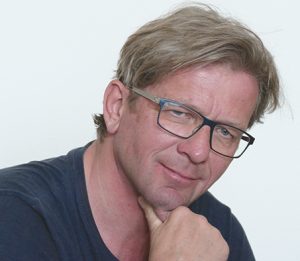Virginia Bono, chef de chœur, Argentine, et Martin Winkler, chef de chœur, Allemagne
Du travail solitaire à la communauté
Bien qu’entouré de choristes, le chef de chœur amateur est plutôt solitaire, c’est bien connu. Le choix du répertoire et le projet artistique qu’il apportera au groupe, les décisions d’étude et d’interprétation et la planification des répétitions sont quelques exemples du travail solitaire auquel se livre chaque chef de chœur. Compte tenu de l’impossibilité d’organiser des répétitions en présentiel en raison de la pandémie de 2020, nombre de ces tâches ont été affectées et l’orientation des priorités a même été modifiée. L’incertitude, la désinformation, le fait de ne savoir ni où ni comment continuer s’opposent à l’exercice de planification et d’anticipation auquel nous sommes habitués.
C’est dans ce contexte que sont apparus, dans le monde entier, des forums et des lieux de rencontre pour les chefs qui cherchaient et partageaient des informations sur la technologie, des stratégies de répétitions virtuelles, des idées d’accompagnement social et de soutien de groupe. D’abord sur les réseaux sociaux, mais ensuite avec une grande capacité de gestion, des groupes et des réunions ont rapidement été organisés sous la forme d’une table ronde – ou plutôt, d’un écran carré. De chefs de chœur solitaires, nous sommes devenus une Communauté. En Amérique latine on l’appelle “Tertulia”, en Allemagne “Stammtisch”, et à travers le monde elle prend d’innombrables autres formes. Dans ces espaces, le sens de la communauté a revêtu un aspect encore plus important. Le soutien, la solidarité, la réflexion et un grand esprit de résilience, d’amour et de responsabilité en tant que responsables de nos chorales ont été au centre des rencontres et des échanges. La créativité a également joué un rôle, et divers projets de coopération ont été imaginés.
Le potentiel caché du répertoire choral
Un texte chanté est un texte soutenu par le langage le plus universel qui soit : la musique. C’est pourquoi les œuvres chorales qui traitent de contenus d’intérêt social sont un puissant vecteur de communication et de sensibilisation. La violence, la diversité, les droits de l’Homme, la valeur des communautés autochtones dans le monde, la préservation de l’environnement et l’harmonie avec la nature sont quelques-uns de ces thèmes importants qui prennent une autre dimension lorsqu’ils font partie d’un programme de concert.
Une icône de ce thème est l’œuvre Kasar mie la gaji du compositeur Alberto Grau, présentée par sa chorale Schola Cantorum de Venezuela lors du IIe Symposium mondial de musique chorale en Suède, en 1990. Avec cette composition, Grau exprime déjà sa grande préoccupation pour le problème de l’environnement et le porte sur la scène chorale. L’œuvre est largement interprétée par de nombreuses chorales en Amérique latine et dans le reste du monde en format chœur mixte ou voix égales.
Nous sommes la voix de notre planète
Nous sommes la première génération à savoir exactement ce que nous faisons, et nous sommes la dernière qui peut nous remettre sur la bonne voie pour préserver notre planète. Il y a un demi-siècle, lorsque le “Club de Rome” nous a montré nos limites de croissance, il était difficile d’imaginer que les sombres prévisions de l’époque pourraient être dépassées. Bien plus tard, l’actuelle pandémie de Coronavirus nous montre de façon dramatique combien il est important de garder ses distances et de respecter les habitats des hommes et des animaux afin de réduire le risque de futures zoonoses. Nous devons créer une nouvelle prise de conscience maintenant, pour mettre fin à la surexploitation de la nature et au gaspillage de nos ressources.
Avec le projet Our Voice for our Planet, nous voulons rassembler des chœurs du monde entier qui veulent soutenir activement la préservation de notre planète. Cette idée est née simultanément en Allemagne et en Argentine, pour sensibiliser les chorales du monde entier à ce sujet important. Ainsi, nous avons pu convaincre des équipes de chefs de chœur très intéressés par l’inclusion dans leur répertoire d’œuvres touchant à ces thèmes. Nous avons ainsi pu convaincre leurs chœurs de les interpréter plus tard lors de concerts, de réunions de chœurs et de festivals. À cette fin, nous avons demandé à des compositeurs issus de milieux culturels très divers de composer de nouvelles œuvres sur le thème de la préservation de la faune et de la flore. L’objectif est de créer une littérature intéressante pour de nouveaux programmes, et ce pour le plus grand nombre de chœurs possible. Pour les chœurs d’enfants et de jeunes, par exemple, 14 nouvelles chansons sur le climat sont actuellement en cours de composition par Reinhard Horn, qui seront interprétées partout au printemps prochain dans le cadre du projet Earth Choir Kids, en coopération avec le Deutscher Chorjugend (Jeunesse chorale allemande) – qui regroupe plus de 3000 chœurs – et Greenpeace. Carla Maffioletti, compositrice d’origine brésilienne et qui travaille maintenant aux Pays-Bas, vient de publier son opéra Paradijsvogel (Oiseau de paradis) (sur la destruction des forêts tropicales au Brésil). Les partitions pour chœurs a cappella ainsi qu’une instrumentation réduite de cette œuvre seront prochainement publiés afin de rendre possible son exécution prochains. Un premier petit hymne intitulé Our voice for our planet a été rédigé par le compositeur italien Battista Pradal. Il est disponible pour tous les types d’ensembles choraux en téléchargement – tout comme notre logo – sur notre site web du même nom. Nous y recueillons également d’autres compositions et signalons comme des News les activités dignes d’être imitées. Nous avons le plaisir d’annoncer avoir recueilli le soutien de plusieurs festivals, dont le festival Harmonie, qui aura lieu du 18 au 21 mai 2023 à Lindenholzhausen, en Allemagne.
Après seulement quelques semaines, plus de 80 chorales, ensembles et solistes de plus de 20 pays européens se sont déjà inscrits sur notre liste de soutiens “We’re in”. Vous pouvez également le faire en envoyant un courriel à l’adresse suivante: info@our-voice-for-our-planet.com.
Soyons la voix de notre planète, diffusons notre idée et aidons notre vision d’un monde meilleur à toucher tout le monde grâce au langage universel de la musique.
https://our-voice-for-our-planet.com
 VIRGINIA BONO est chef de chœur et professeur de direction de chœur. Elle dirige le Meridies Choral Studio, le Women’s Youth Choir et le Children’s Choir du Santa Fe Choral Institute. Professeur de direction à Tactus (Groupe d’étude de la direction de chœur). Chef de chœur invitée, jury de concours de chant choral et professeur de cours, d’ateliers et de masterclasses en Argentine, en Amérique latine et en Europe. Elle collabore avec les compositeurs et les éditeurs pour la promotion et la diffusion de la musique chorale argentine et latino-américaine. Membre d’Adicora (Association de Chefs de chœur d’Argentine), Voces de Latinoamérica et Choralspace. Courriel: virginiabono@hotmail.com
VIRGINIA BONO est chef de chœur et professeur de direction de chœur. Elle dirige le Meridies Choral Studio, le Women’s Youth Choir et le Children’s Choir du Santa Fe Choral Institute. Professeur de direction à Tactus (Groupe d’étude de la direction de chœur). Chef de chœur invitée, jury de concours de chant choral et professeur de cours, d’ateliers et de masterclasses en Argentine, en Amérique latine et en Europe. Elle collabore avec les compositeurs et les éditeurs pour la promotion et la diffusion de la musique chorale argentine et latino-américaine. Membre d’Adicora (Association de Chefs de chœur d’Argentine), Voces de Latinoamérica et Choralspace. Courriel: virginiabono@hotmail.com
 Depuis plus de 40 ans, MARTIN WINKLER est chef, enseignant en Conservatoire supérieur, professeur de chant, directeur de l’école de musique de Dreieich (Allemagne), coach, animateur d’ateliers, membre de jurys, chef invité et directeur de festival. Il a été un chef à succès pour chœurs amateurs ambitieux (par exemple les 80 hommes de l’HARMONIE Lindenholzhausen), de chœurs de chambre, et chef invité de chœurs professionnels (par exemple les chœurs d’État de Lettonie et de Cuba), et chante basse dans plusieurs ensembles vocaux un-par-voix. Outre des programmes a cappella exigeants, il dirige un répertoire stylistiquement large, allant des Vêpres de la Vierge (Vespro della Beata Vergine) de Monteverdi au “Lobgesang” de Mendelssohn en passant par de nombreux oratorios de Haendel et la “Messe en si mineur” de Bach. Il a aussi dirigé de nombreuses premières mondiales. Il est passionné par les redécouvertes et les nouvelles découvertes de compositeurs, par exemple: Puccini senior, Romberg, Herzogenberg et Pradal. Des productions télévisées, radiophoniques et discographiques ainsi que de nombreux prix de concours nationaux et internationaux complètent sa carrière artistique. Courriel: winkler.dirigent@gmail.com
Depuis plus de 40 ans, MARTIN WINKLER est chef, enseignant en Conservatoire supérieur, professeur de chant, directeur de l’école de musique de Dreieich (Allemagne), coach, animateur d’ateliers, membre de jurys, chef invité et directeur de festival. Il a été un chef à succès pour chœurs amateurs ambitieux (par exemple les 80 hommes de l’HARMONIE Lindenholzhausen), de chœurs de chambre, et chef invité de chœurs professionnels (par exemple les chœurs d’État de Lettonie et de Cuba), et chante basse dans plusieurs ensembles vocaux un-par-voix. Outre des programmes a cappella exigeants, il dirige un répertoire stylistiquement large, allant des Vêpres de la Vierge (Vespro della Beata Vergine) de Monteverdi au “Lobgesang” de Mendelssohn en passant par de nombreux oratorios de Haendel et la “Messe en si mineur” de Bach. Il a aussi dirigé de nombreuses premières mondiales. Il est passionné par les redécouvertes et les nouvelles découvertes de compositeurs, par exemple: Puccini senior, Romberg, Herzogenberg et Pradal. Des productions télévisées, radiophoniques et discographiques ainsi que de nombreux prix de concours nationaux et internationaux complètent sa carrière artistique. Courriel: winkler.dirigent@gmail.com
Traduit de l’espagnol par Stella Djouenwou, Cameroun, et de l’allemand par Gabriel Beauvallet-Bauchet, France, relu par Jean Payon
Concours de composition de musique chorale sur le thème de l’écologie
concursovocesdelatinoamerica@gmail.com
„Voces de Latinoamérica“ est une structure composée de chefs de chœur issus de 20 pays d’Amérique latine; elle a vu le jour suite à une discussion de groupe en 2020.
En 2021, ses membres vont parrainer un concours de composition de musique chorale traitant de sujets environnementaux – à la fois de la protection de la nature et de la faculté de vivre en harmonie avec elle – en marge du festival „América Latina Canta Unida“. Les morceaux lauréats seront intégrés au répertoire du festival et donnés en représentation par des centaines d’ensembles à travers le continent. Les compositions, pour chœurs mixtes SATB ou SAB et de difficulté moyenne, doivent durer entre deux et quatre minutes. L’appel à candidatures est ouvert aux compositeurs natifs ou résidents d’Amérique latine et a deux objectifs principaux: promouvoir les compositions chorales sur des thématiques écologiques et inciter les chœurs à mettre ces pièces au répertoire de leurs concerts, en prenant part à un mouvement d’ampleur pour éveiller les consciences sur ces problématiques et le besoin urgent d’apporter des solutions ainsi que l’implication de tous.
Les pays d’Amérique latine disposent de peu de politiques publiques en lien avec l’écologie et d’autres sujets peuvent sembler plus urgents à traiter par les gouvernements. La possibilité d’un soutien économique venant des citoyens et à destination de grandes entreprises écologiques est également faible en raison du taux élevé de pauvreté. Cependant, notre planète a désormais besoin de nous tous, et les chœurs peuvent porter nos voix, nos chants atteindre les cœur des chanteurs, du public et nourrir les valeurs écologiques des futures générations.
Chacun.e d’entre nous peut être la voix de notre planète. Le moment est venu.
Traduit de l’anglais par Barbara Pissane, relu par Isabelle Métrope



